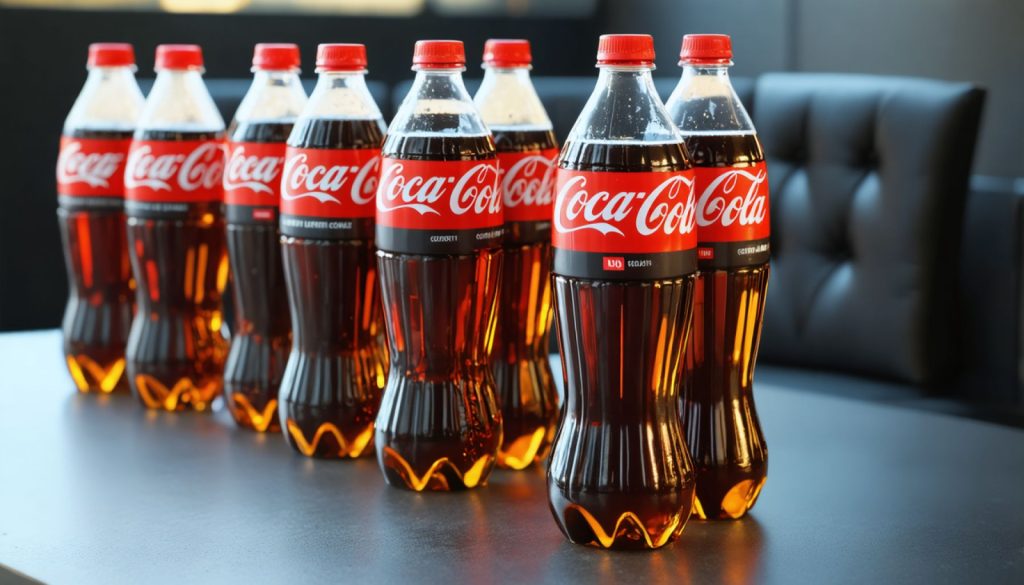
- Coca-Cola’s stock surged by 17% in early 2025, outperforming the S&P 500, driven by strategic expansion and innovation.
- A $1.4 billion investment in Argentina is set to enhance production capacity, logistics, and infrastructure.
- The brand boasts over 300 products globally, with diversification including Sprite, SmartWater, and Costa Coffee’s acquisition.
- Q1 financials show strong revenue and earnings growth, earning “Strong Buy” ratings from analysts.
- Coca-Cola leverages AI for consumer insights and strategic initiatives, enhancing its global competitive edge.
- Direct-to-consumer channels and innovations like Studio X personalize customer experiences.
- Steady dividend growth since 1970 makes Coca-Cola stock attractive for long-term investors.
- 65% of revenue from international markets poses currency fluctuation risks, though hedging provides some protection.
- Analysts project the stock could reach $77 per share, underscoring its financial resilience and innovative strategies.
The familiar fizz of Coca-Cola isn’t merely refreshing palates worldwide; it’s churning the gears of a financial juggernaut that’s scripting a new chapter of corporate success. In the bustling world of beverages, Coca-Cola (NYSE: KO) has effortlessly swum against the currents, riding a wave of strategic expansion and innovation in 2025 — and the markets have noticed.
Imagine a world where Coca-Cola leveraged its brand mystique to secure a 17% gain in its stock within the first few months of 2025, while the broader S&P 500 struggled to stay afloat. This year, the company has unveiled plans to invest over $1.4 billion to supercharge its operational capacity in Argentina. This investment is intended to fortify production lines, streamline logistics, and enhance infrastructure, promising to untangle the skeins of complexity in a fast-evolving global economy.
Peering into Coca-Cola’s grand tapestry of products reveals more than the ubiquitous red cans. With over 300 diverse offerings, the brand’s diversification strategy has blossomed into a vine touchiong every corner of the globe. From the effervescent zest of Sprite to the soothing chill of SmartWater, the company’s repertoire is a testament to centuries of branding acumen. More recently, its acquisition of Costa Coffee signals an audacious leap into the caffeinated echelons of global beverages, aiming to stake a solid claim in the burgeoning coffee market.
Coca-Cola’s quarterly financials mirror this strategy’s efficacy, with Q1 reports showing enviable revenue and earnings per share growth. Buoyed by this robust performance, Wall Street’s confidence glows—analysts are virtually unanimous in their endorsement, with “Strong Buy” ratings bolstering the company’s market position.
One cannot overlook Coca-Cola’s transformative embrace of technology. The company has donned the cloak of digital savviness, employing artificial intelligence to distill consumer data into actionable insights. This technological arsenal helps Coca-Cola outmaneuver competition by predicting market trends and shaping strategic initiatives. Meanwhile, its hyper-localization strategy curates the brand’s portfolio to align with regional tastes, reinforcing consumer loyalty from India to South America.
The bold foray into direct-to-consumer channels enables Coca-Cola to engage deeply with its customer base. Through innovations like Studio X, an advanced digital marketing hub, the company harvests insights that drive personalized consumer experiences, fortifying relationships with their customer ecosystem.
Coca-Cola has also carved out a niche as a steady dividend stalwart, its attractiveness further enhanced by unwavering dividend growth since 1970. This makes its stock a coveted inclusion in portfolios seeking stable, long-term yield, with forecasts suggesting continued rises well into the future.
However, the global stage is not without its perils. With 65% of Coca-Cola’s revenue sprouting from international roots, currency fluctuations present a looming challenge. Although the beverage titan employs hedging as a tactical shield, the exposure to volatile currencies could spur unforeseen ripples.
Analysts foretell a promising future, with 2025 projections hinting at a stock price climbing towards $77 per share. The blend of innovative thrusts, financial resilience, and brand loyalty positions Coca-Cola as a luminary, not just in the realm of beverages, but as a beacon in the global stock markets. While no crystal ball can unerringly predict market twists, Coca-Cola’s strategic endeavors paint an inspiring picture of a brand vigorously poised to nourish its century-old legacy for generations to come.
In an unpredictable economic landscape, the tale of Coca-Cola serves as an enthralling reminder: endurance and evolvement, hand in fizzing hand, craft the narrative of success.
Can Coca-Cola’s Strategic Moves in 2025 Secure Its Role as a Global Beverage Titan?
Additional Insights on Coca-Cola’s Strategy
Expansion into New Markets and Product Diversification
1. The Costa Coffee Acquisition: Coca-Cola’s purchase of Costa Coffee illustrates its aggressive entry into the coffee sector, aiming to compete with giants like Starbucks and Nestlé. This move adds a robust portfolio of coffee products and retail experiences, enhancing Coca-Cola’s presence in high-growth beverage categories (Source: the Coca-Cola Company).
2. Investments in Technology and AI: Integrating AI into operations enables Coca-Cola to harness consumer data effectively. By utilizing machine learning and predictive analytics, Coca-Cola can tailor its marketing strategies and product offerings to meet regional consumer preferences, potentially increasing market share.
Sustainable Practices and Environmental Concerns
1. Sustainability Initiatives: Coca-Cola is committed to sustainability through its “World Without Waste” initiative, which aims to collect and recycle every bottle or can it sells by 2030. The company is also investing in creating fully recyclable packaging and improving water-use efficiency (Source: the Coca-Cola Company).
2. Environmental Challenges: Despite efforts, Coca-Cola faces criticism regarding its environmental impact, particularly concerning plastic pollution. Addressing these issues remains crucial as consumers increasingly prefer brands with strong environmental ethics.
Market Forecasts & Industry Trends
1. Global Beverage Market Growth: The non-alcoholic beverage market is predicted to grow steadily over the next decade, with increasing demand for functional drinks and health-focused beverages. Coca-Cola’s diversification into these areas could drive further revenue growth.
2. E-commerce and Direct-to-Consumer Trends: As Coca-Cola enhances its direct-to-consumer channels, it taps into a growing trend that offers higher margins and valuable consumer data. This strategy not only boosts sales but also strengthens consumer relationships by providing personalized experiences.
Pros & Cons of Coca-Cola’s Strategic Initiatives
Pros:
– Brand Loyalty: Coca-Cola’s strong brand recognition and customer loyalty position it favorably in competitive markets.
– Dividend Stability: Known for its steady dividend growth, Coca-Cola provides a reliable income source for investors seeking stability.
Cons:
– Currency Fluctuation Risks: With substantial international operations, Coca-Cola is vulnerable to currency volatility, which could impact profitability.
– Environmental Criticisms: Ongoing challenges with plastic usage could affect brand reputation if not addressed adequately.
Actionable Recommendations
– For Investors: Consider Coca-Cola as a long-term investment for portfolio diversification due to its stable dividends and growth potential in emerging markets.
– For Consumers: Engage with Coca-Cola’s new products, particularly in the coffee and health beverage segments, which align with current wellness trends.
– For Environmental Advocates: Monitor Coca-Cola’s sustainability efforts and encourage continued accountability and improvements in reducing its carbon footprint.
Conclusion
Coca-Cola’s robust strategic expansion into new markets, technological advancements, and focus on sustainability initiatives fuel its potential for continued success in the global beverage sector. While challenges like currency risks and environmental impact persist, the company’s innovation and brand strength make it a formidable player well-prepared for the future. As Coca-Cola navigates these opportunities and challenges, its actions today will play a pivotal role in securing a lasting legacy.



